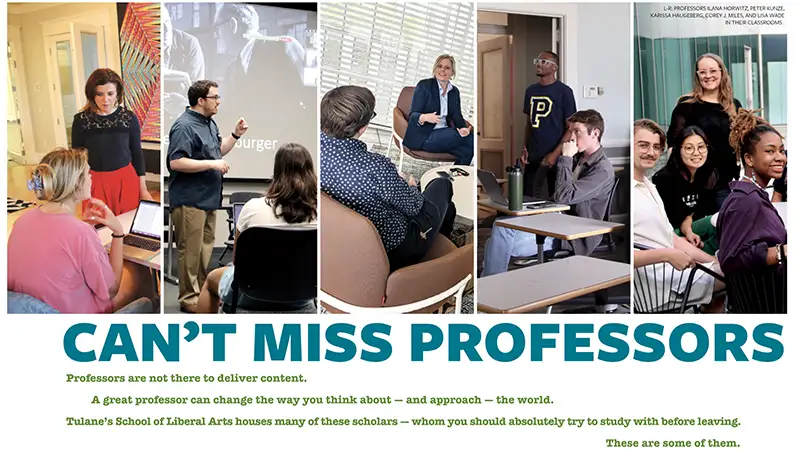
New Orleans Book Festival: Student's Perspectives
Four English majors share their highlights from last weekend's "Mardi Gras for the Mind," which saw a plethora of School of Liberal Arts faculty, staff, and alumni featured on panels throughout Tulane's third literary festival.
January 24, 2024
Some new content for our readers this year! If you’re interested in the breadth and scope of Tulane’s Liberal Arts—with 35+ academic departments and interdisciplinary programs—this is a resource for recommendations from students, faculty, and staff. Bookmark it for an ongoing, crowdsourced list of contributions from members of our community.
The Individual, Society, and State - PECN303
Associate Professor Caroline Arruda, Philosophy
This course presents an integrated study of the main alternatives in political ideology (liberalism, socialism, fascism, Marxism) advocated in the modern world and the exemplifications of these ideologies in practice in the modern world (post-war West Germany, 20th-century Britain, Mussolini's Italy, the former Soviet Union).
Elementary Haitian Creole II - HACR1020
PhD candidate Kendall Medford, Linguistics
This class is intended for students who have taken Elementary Haitian Creole I or who have already acquired competencies in Haitian Creole (e.g. high school, junior college, or exposure to Creole at home or abroad). Students will be exposed to more complex linguistic forms and longer texts. They will develop skills to participate in conversations related to real events in Haiti, and they will improve their ability to work on longer writing assignments. Communicative contexts and grammatical guides are introduced in class through a variety of activities, and acquisition is reinforced by interactive use of new structures and vocabulary. Prerequisite: HACR 1010.
Contemporary European Philosophy - PHIL3110
Celia Scott Weatherhead Professor of Philosophy Richard Velkley, Philosophy
A study of major philosophical issues and figures in 20th-century continental philosophy, including Husserl, Heidegger, and Sartre, among others.
Development: Pitch to Picture - DMPC3010
Visiting Assistant Professor Dodd Loomis, Theatre
This course familiarizes students with the complex process by which film and television projects are found, proposed, sold, and produced. The course covers the search for stories, writing coverage, pitch pages, beat sheets, script notes, developing screenplays, and packaging a project for presentation to potential buyers. Prerequisite: DMPC 2002.
Disasters and Past Societies - ANTH3435
Professor Chris Rodning, Anthropology
This class explores case studies on how past societies have prepared for or responded to disasters, critically reflects on "natural" and "cultural" forces that contribute to catastrophic events and that shape the aftermath of disasters, offers comparative assessments of relationships between culture and environment, and the application of resilience theory and models of cultural collapse to understand the effects of disasters on past societies.
Sociology of Crime Control - SOCI1901
Professor Kevin Gotham, Sociology
This course is an introduction to the theories, methods, and practices relating to crime control and prevention for students interested in studying criminal justice, criminology, and sociology. The course engages a variety of criminological theories including routine activities theory, situational-opportunity theories, crime pattern theory, and environmental criminology, among others. Students will investigate strategies designed to prevent conditions that foster deviance, and prevention measures directed toward persons or conditions with a high potential for deviance. The course also examines criminological theories and prevention strategies related to fraud, white collar and corporate crime.
Read more about “Can't Miss Professors” we spotlighted in the latest issue of the Tulane School of Liberal Arts Magazine 

